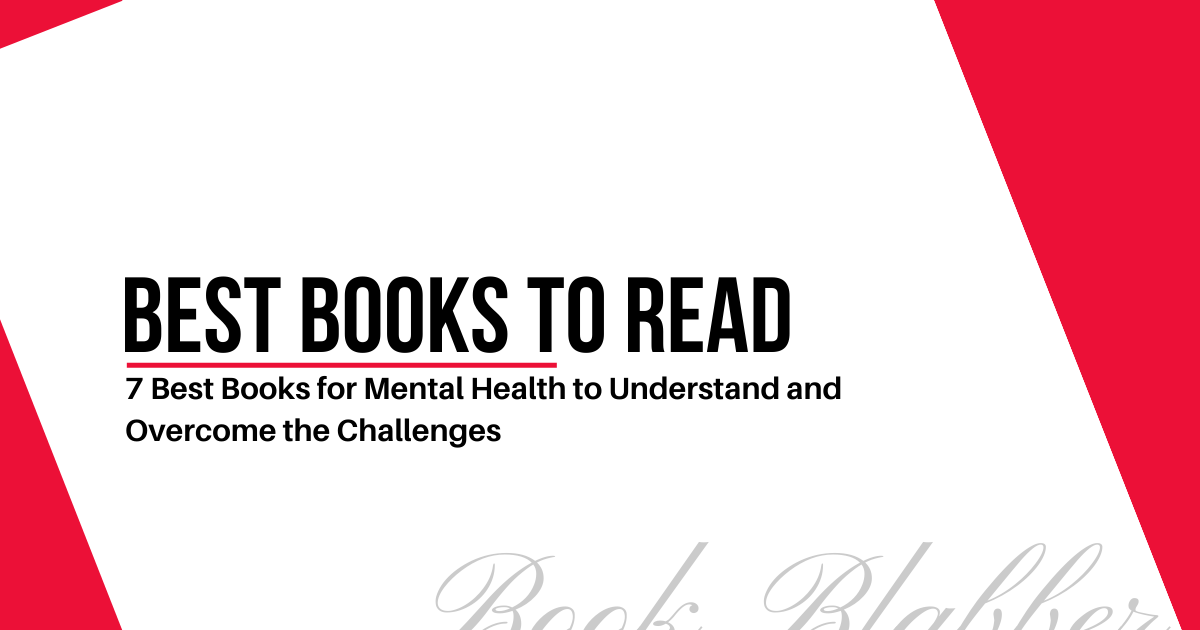7 Best Books for Mental Health to Understand and Overcome the Challenges

Mental health is an aspect of our well-being that’s often difficult to understand. But you'll find many books on mental health to notice the symptoms and gain a better understanding of your health. They're among the most valuable resources for mental health education.
Here, I’ve compiled a list of the best books for mental health to help you. Whether you want to gain a better understanding of the challenges or simply find inspiration, these mental health books will help you take care of self. These books offer a wealth of knowledge and wisdom.
The Body Keeps the Score, by Bessel van der Kolk
The Body Keeps the Score is one of the best books on mental health. It’s a seminal work on the effects of trauma on the brain and body. It offers insights into brain’s functions, and strategies and effective treatments for healing from traumatic stress. This book is a valuable resource for anyone struggling with trauma-related mental health challenges. It suggests ways of healing through mindfulness techniques, yoga and other therapies.
Top 5 Lessons from the book:
As long as you keep secrets and suppress information, you are fundamentally at war with yourself… The critical issue is allowing yourself to know what you know.
Being able to feel safe with other people is probably the single most important aspect of mental health; safe connections are fundamental to meaningful and satisfying lives.
We have learned that trauma is not just an event that took place sometime in the past; it is also the imprint left by that experience on mind, brain, and body.
Neuroscience research shows that the only way we can change the way we feel is by becoming aware of our inner experience and learning to befriend what is going inside.
Beneath the surface of the protective parts of trauma survivors there exists an undamaged essence, a Self that is confident, curious, and calm, a Self that has been sheltered from destruction by the various protectors that have emerged in their efforts to ensure survival.
Also Read: 31 Best Books to Read for Life and Transform It
Emotional First Aid, by Guy Winch
Emotional First Aid is another of the best mental health books out there. It offers practical and accessible strategies to deal with emotional pain and distress. Guy is a licensed psychologist, who, in this book, explains how to identify and address common emotional injuries. He shares many anecdotes about patients he has treated over the years. The book also offers concrete, easy-to-use exercises backed up by science to overcome mental health and emotional issues.
Top 5 Lessons from the book:
Failure is so common a human experience that what distinguishes us from one another is not that we fail but rather how we respond when we do.
The most frequent reasons we get turned down are because of a lack of general chemistry, because we don’t match the person’s or company’s specific needs at that time, or we don’t fit the narrow definition of who they’re looking for – not because of any critical missteps we might have made nor because we have any fatal character flaws.
We often neglect our psychological wounds until they become severe enough to impair our functioning.
The more distractions we have from which to choose, the more effectively we will be able to derail the ruminative train of thoughts that plague us.
Intense ruminations can often make us so focused on our own emotional needs that we become blind to those of the people around us and our relationships often suffer as a result.
Back, After the Break, by Osher Gunsberg
Back, After the Break is a memoir of Osher Gunsberg, a television and radio personality from Australian. In this Osher Gunsberg book, you'll read about his journey through mental health challenges, including anxiety, depression, and addiction. He shares personal experiences and insights into his recovery process. He also talks how he's come to terms with his issues to live an authentic, rich and fulfilling life.
Top 5 Lessons from the book:
Find humility before humility finds you.
There’s no such thing as the one. There’s only the one who’s willing to work on it with you.
If you want anything to change in your life – it requires action. Sometimes, the only way out of the flames is through them.
I’d learned that mood follows action.
You’re not doing anything and that means that you can do anything.
Also Read: 7 Best Books for Anxiety
Reasons to Stay Alive, by Matt Haig
Reasons to Stay Alive is another memoir book that offers a personal account of the author's struggle. It’s one of the best books about mental health with a raw account of what it's like to live with depression and anxiety. It also offers a message of hope and encouragement. It encourages celebrating the small joys and moments of peace. Matt’s frankness is inspiring to those who feel daunted by depression and illuminating to those who are mystified by it.
Top 5 Lessons from the book:
How to stop time: kiss. How to travel in time: read. How to escape time: music. How to feel time: write. How to release time: breathe.”
The world is increasingly designed to depress us. Happiness isn’t very good for the economy.
Wherever you are, at any moment, try and find something beautiful. A face, a line out of a poem, the clouds out of a window, some graffiti, a wind farm. Beauty cleans the mind.
There is no standard normal. Normal is subjective. There are seven billion versions of normal on this planet.
Maybe love is just about finding the person you can be your weird self with.
Also Read: 11 Best Books for Depression
An Unquiet Mind, by Kay Redfield Jamison
An Unquiet Mind is a memoir of a clinical psychologist recounting her own struggles with bipolar disorder. It’s probably the best book on mental health written by a psychologist. The book is unique in that it offers both a personal account of the author’s struggles, as well as an academic and clinical perspective on bipolar disorder. It sheds light on therapy, lifestyle changes and other therapies for this condition.
Top 5 Lessons from the book:
If I can't feel, if I can't move, if I can't think, and I can't care, then what conceivable point is there in living?
There is a particular kind of pain, elation, loneliness, and terror involved in this kind of madness. When you're high it's tremendous. The ideas and feelings are fast and frequent like shooting stars, and you follow them until you find better and brighter ones.
No amount of love can cure madness or unblacken one's dark moods. Love can help, it can make the pain more tolerable, but, always, one is beholden to medication that may or may not always work and may or may not be bearable”
Which of my feelings are real? Which of the me is me? The wild, impulsive, chaotic, energetic, and crazy one? Or the shy, withdrawn, desperate, suicidal, doomed, and tired one? Probably a bit of both, hopefully much that is neither.
We all build internal sea walls to keep at bay the sadnesses of life and the often overwhelming forces within our minds.
The Secret, by Rhonda Byrne
The Secret isn’t one of the books for mental growth, but it’s still a helpful resource. It’s a self-help book that focuses on the power of positive thinking and the law of attraction. Author believes that by changing your thoughts and beliefs, you can manifest your desires and live the life you want. It suggests a variety of techniques like affirmations and gratitude to achieve that. The book includes several success stories from individuals who have used these techniques to turn their life.
Top 5 Lessons from the book:
Be grateful for what you have now. As you begin to think about all the things in your life you are grateful for, you will be amazed at the never ending thoughts that come back to you of more things to be grateful for.
There is no such thing as a hopeless situation. Every single circumstance of your life can change!
There is a truth deep down inside of you that has been waiting for you to discover it, and that truth is this: you deserve all good things life has to offer.
Your power is in your thoughts, so stay awake. In other words, remember to remember.
When you want to attract something into your life, make sure your actions don’t contradict your desires.
Maybe You Should Talk to Someone, by Lori Gottlieb
Maybe You Should Talk to Someone is a memoir of a psychotherapist, in which she recounts her experiences as both a therapist and a patient. The book offers an account of what it's like to be on both sides of the therapy relationship. It provides insights into the therapy process, and how it can be helpful in managing mental health challenges. Lori gives us a peek into our own mysterious lives and our power to transform them.
Top 5 Lessons from the book:
We can’t have change without loss, which is why so often people say they want change but nonetheless stay exactly the same.
Part of getting to know yourself is to unknow yourself – to let go of the limiting stories you’ve told yourself about who you are so that you aren’t trapped by them, so you can live your life and not the story you’ve been telling yourself about your life.
We tend to think that the future happens later, but we're creating it in our minds every day.
There’s no hierarchy of pain. Suffering shouldn’t be ranked, because pain is not a contest.
Relationships in life don't really end, even if you never see the person again. Every person you've been close to lives on somewhere inside you.
Also Read: 9 Best Books to Find Purpose and Meaning in Life
Ok, those were all the best books for mental health I have for you. These are some of the best books to help in overcoming depression and anxiety and achieving mental stability.
Liked the article?
Join Book Blabbers WhatsApp group to bond over books, memes and quotes.
Subscribe to Book Blabber's Bulletin to get book summaries, reading tips and occasional hugs in your inbox.







Comments